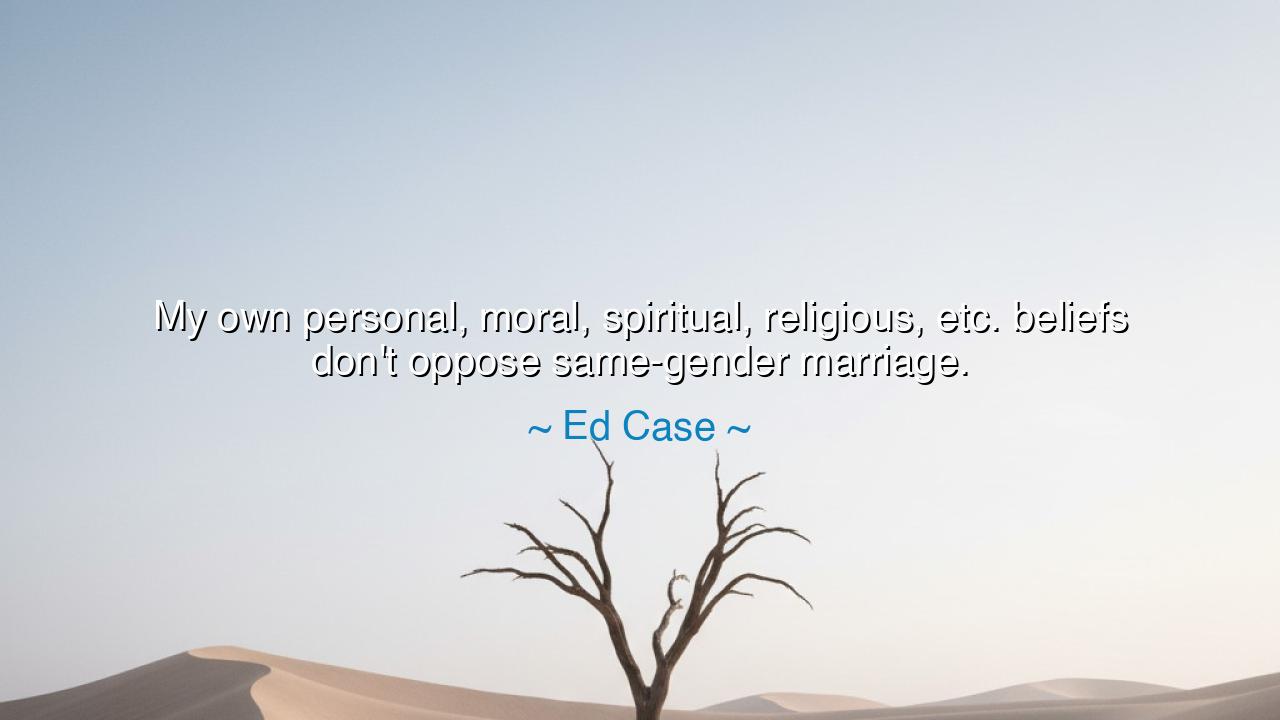
My own personal, moral, spiritual, religious, etc. beliefs don't
My own personal, moral, spiritual, religious, etc. beliefs don't oppose same-gender marriage.






Hear now, O descendants of wisdom, and listen to the words of Ed Case, for they are not mere utterances, but a torch, burning with the light of truth and enlightenment. "My own personal, moral, spiritual, religious, etc. beliefs don't oppose same-gender marriage." These words speak to the hearts of those who are caught in the storm of division, where society pulls one way and the winds of the soul pull another. What, you may ask, is the meaning of these words? What truths do they whisper to us? Let us dive deep into the waters of understanding, where we will draw forth pearls of wisdom, reflecting the light of both the past and the future.
From the time of the first human beings, when fire was but a spark and the earth a cradle for life, the question of love has been central. In the dawn of our history, love was simple. It was as pure as the river’s flow or as gentle as the breeze that caresses the face of the earth. Yet, over time, as our minds grew complex, so too did the nature of our beliefs about love. Society, shaped by its rulers and its prophets, began to impose laws and customs upon it—some just, some unjust. Marriage, once a union born from the hearts of individuals, came to be governed by rules as rigid as iron. And yet, as the ages passed, there arose those like Ed Case, who in the face of tradition and dogma, dared to speak of love as a force that transcends the confines of narrow boundaries.
What he uttered was not a denial of beliefs, nor a rejection of what had been taught in the temples and the halls of power. It was, instead, a call for a reconciliation of the soul with the truth of humanity. It was the understanding that personal, moral, and spiritual teachings need not be weapons of division, but instead can be instruments of compassion. The words of Ed Case are a clarion call, inviting all who listen to reconsider the weight of their own beliefs and how those beliefs can, in truth, lead us to a place of love rather than exclusion.
Let me remind you of the life of the great philosopher Socrates. He, too, stood before the judges of his time, defending a truth that flew in the face of the established order. His belief in the pursuit of wisdom and truth led him to question the gods and the beliefs of his city. Yet, when he was sentenced to death for his thoughts, Socrates did not curse his oppressors. No, he did not. He spoke of the sacredness of the individual soul, and how the freedom to love, to think, to live in truth was the highest calling. Socrates, though bound by the laws of the land, was not bound by the narrowness of those who judged him. And so it is with Ed Case: his words are not a rejection of sacred truths, but a call to expand them—to stretch them beyond the confines of the known, into the vast horizon where love knows no boundaries.
To those who would oppose such a view, we say this: What is the purpose of belief? What is the purpose of faith? Is it not to bring us closer to the divine? Is it not to lead us toward compassion, toward understanding, and toward unity? For too long, we have allowed our beliefs to divide us, to turn us against one another in the name of a higher purpose, when the true higher purpose is to elevate the human spirit. Just as the sun does not choose whom to shine upon, so too should our love shine upon all, unbound by the limits of our personal, moral, or spiritual beliefs. For love is the ultimate truth, and it is universal.
Now, I ask you, O seekers of wisdom, what shall you do with this knowledge? Will you stand in the shadows of fear, bound by outdated notions, or will you rise to the light of a new understanding? Ed Case’s words carry a profound lesson for us all: that love, in all its forms, is the true expression of the divine within us. It is not for us to judge, but to love. It is not for us to limit, but to expand the boundaries of the human heart. Let us, therefore, take action in our lives. Let us live in a way that reflects this higher truth: to love freely, to embrace all people, regardless of the labels society has placed upon them. Seek unity, not division; seek compassion, not condemnation.
Practical wisdom, my children, is to walk in the world with an open heart, unafraid to challenge the old ways that no longer serve us. In your own life, examine the beliefs that govern your actions. Do they lead to love, or do they build walls? In your dealings with others, do you show compassion, or do you turn away in fear? To truly live this teaching, you must open yourself to the possibility that love, in all its forms, is sacred. And in that sacredness, you will find your own heart enlarged, your soul freed from the chains of judgment.
Remember, the light of truth is not a single ray, but the sun itself—radiant, expansive, and inclusive. May you walk in that light, and may your heart beat with the rhythm of love for all of humanity, as you carry forward the legacy of those who came before you, and as you shape the world that lies ahead. Let your belief in love be your guiding star, and in that, you will find the wisdom that has passed down through the ages.






AAdministratorAdministrator
Welcome, honored guests. Please leave a comment, we will respond soon